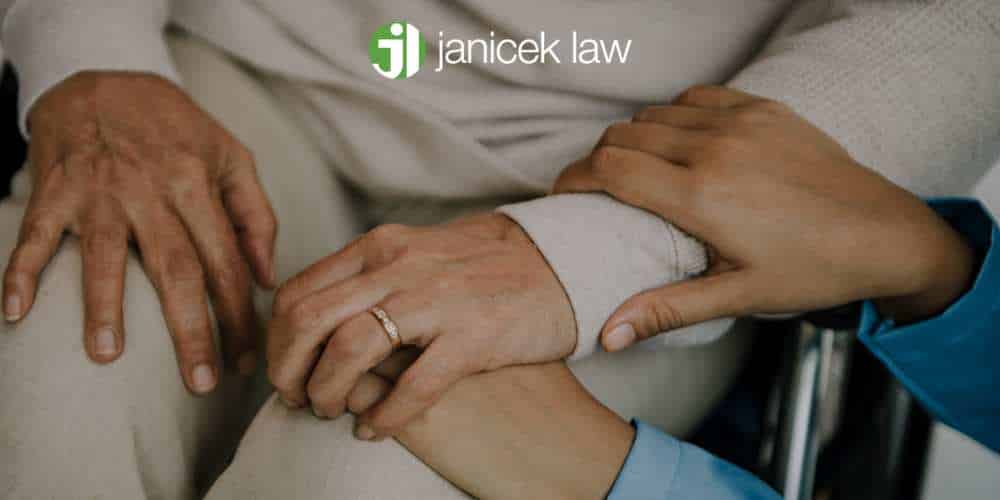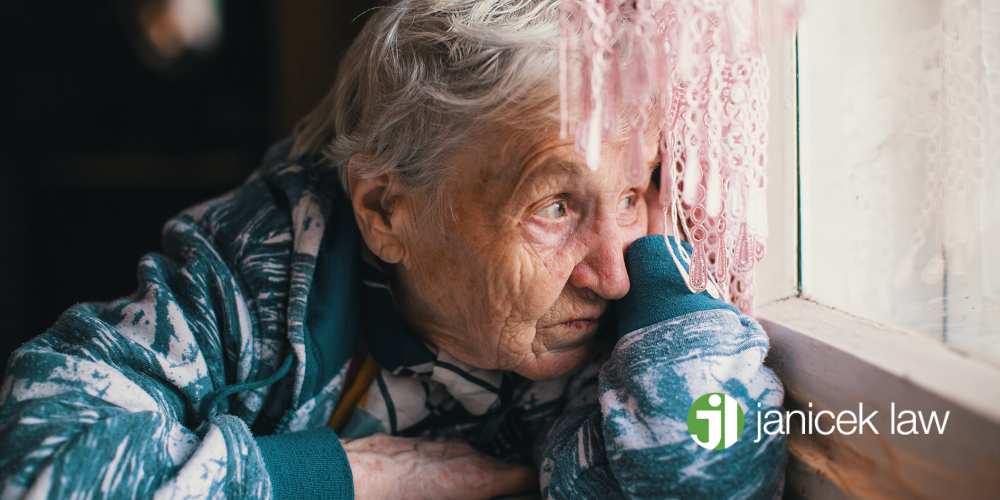San Antonio Nursing Home Sexual Abuse Lawyer
A San Antonio nursing home sexual abuse lawyer at Janicek Law can help sexually abused nursing home residents protect their rights. Nursing homes and care facilities are meant to be safe havens for elderly men and women. Unfortunately, this trust is sometimes violated through acts of elder sexual abuse. In San Antonio, TX, Janicek Law has seen firsthand the devastating impact of sexual assault on elderly victims and their families.
If your elderly loved one has been sexually abused in nursing homes or assisted care facilities, you may have grounds to file a nursing home abuse lawsuit. The San Antonio nursing home abuse lawyers at Janicek Law have decades of combined experience in protecting and defending nursing home residents from all forms of elder abuse and neglect, including bedsores, falls resulting in head injury, physical abuse, and much more. Our personal injury lawyers work tirelessly to ensure our local elders are treated with the respect they deserve.
Call our San Antonio nursing home abuse and neglect attorneys at 210-366-4949 today.
What is Sexual Abuse in Nursing Homes?

Sexual abuse in nursing homes encompasses a range of non-consensual sexual interactions with elderly residents. Sexual violence can include unwanted sexual contact, sexual assault, rape, forced nudity, and even the exploitation of an elderly person through the production of pornography. The key aspect of elder abuse is that it involves any sexual activity to which the nursing home resident has not consented, often because they are unable to consent due to mental or physical incapacity.
What Constitutes Elder Sexual Abuse in Texas?
It’s crucial to note that consent is a key issue in defining what constitutes sexual abuse according to federal and state laws. According to elder abuse laws including state and federal nursing home laws, an elderly person with dementia or other cognitive impairments cannot consent. Sexual contact that appears to be consensual is not consensual if the elderly person cannot fully understand the nature and risk factors of the sexual act due to mental incapacity.
The repercussions of this form of physical abuse in nursing homes are profound, with many victims often suffering from physical and emotional scars alongside a loss of trust in their medical care providers.
If you suspect that a loved one is the victim of elder sexual abuse in a nursing care facility, it is critical to seek immediate assistance from authorities and San Antonio sexual abuse lawyers. Our San Antonio nursing home abuse attorneys can build strong nursing home abuse cases against the perpetrator and the nursing home itself for nursing home neglect, if applicable.
Common Types of Elder Sexual Abuse
Elder sexual abuse is a particularly devastating form of mistreatment for elderly women and men that can encompass a range of non-consensual acts. It is important to understand that sexual abuse is not limited to physical abuse; it also occurs with any non-contact actions that are sexually demeaning or exploitative.
Here are the common types of nursing home abuse reported, which family members, friends, and caregivers should be aware of. The reported type of nursing home abuse includes:
- Unwanted Touching: This includes any unwanted sexual contact, such as fondling, kissing, groping, or the manipulation of the elder’s body, as well as the forcing of the elder to touch another person in a sexual manner.
- Sexual Assault or Rape: The most egregious form of elder sexual assault, this is any form of non-consensual sexual intercourse or penetration, however slight, of another person’s body.
- Sexual Harassment: Repeated and unwelcome advances, comments, or any behaviors that create a hostile environment for the resident.
- Forced Nudity: Occurs when an elderly nursing home resident is coerced to undress or remain naked when it is not necessary for medical treatment.
- Sexual Photography: Taking, sharing, or threatening to disseminate photographs of a resident in nude or sexually compromising positions without consent.
- Sexual Threats or Coercion: Using threats to obtain sexual favors or coercing an elder through intimidation or manipulation to participate in sexual activities is considered sexual assault.
- Masturbatory Abuse: Forcing an elder to witness masturbation or coercing the elder into masturbating the perpetrator.
- Sexual Insinuations or Jokes: Making lewd insinuations, telling inappropriate jokes, or making comments that are sexual in nature and unwelcome towards the elderly person.
How Common is Sexual Abuse in San Antonio Nursing Homes?

Statistics on sexual abuse in nursing homes are vastly underreported, so it’s impossible to know just how many victims have been sexually abused in their care facilities and assisted living facilities. The complexity of investigating such nursing home abuse cases, combined with the reluctance of victims or witnesses to come forward, often due to fear of retaliation or shame, means many instances go undocumented.
However, we do know that elder sexual assault is a significant problem. State and federal data from the Administration for Community Living states that there have been more than 20,000 reports of sexual abuse in America’s nursing homes over the last two decades.
Who is the Most At Risk for Elder Sexual Abuse?
Certain residents are at a greater risk of becoming elder sexual abuse victims due to various factors that make them more vulnerable.
- Residents With Dementia: Older persons with Alzheimer’s disease and dementia are particularly vulnerable to elder sexual abuse. Their impaired memory and cognitive functions can be exploited by abusers who may assume that the older adult will not remember the elder sexual abuse or be believed if they report it.
- Residents With Intellectual or Developmental Disabilities: Older adults with intellectual or developmental disabilities may lack the ability to comprehend or report allegations of elder mistreatment, making them easier targets for perpetrators.
- Residents With Physical Disabilities: Physical disabilities can make it difficult for an older person to defend themselves or avoid unwanted interactions, placing them at a heightened risk for elder sexual abuse.
- Elderly Women and Female Residents: While sexual abuse can happen to anyone, regardless of gender, elderly women statistically face a greater risk of elder sexual abuse compared to elderly men in nursing home settings.
Other risk factors for nursing home sexual abuse include social isolation from friends and family members and general neglect from their caretakers. If your elderly loved one has one of these risk factors, it’s crucial to visit them daily or weekly, build a loving and trusting relationship with them, and frequently ask them how they are doing and feeling.
Possible Perpetrators of Elder Sexual Abuse in Nursing Homes

Perpetrators of elder sexual abuse in nursing homes can be anyone with access to the residents, including:
- Staff Members: Caregivers, specifically male caregivers or other staff members in a nursing home or assisted living facility, may exploit their position of power.
- Other Nursing Home Residents: Elder sexual abuse occurs between other residents, especially if one nursing home resident is more vulnerable than the others, either naturally or due to physical or chemical restraints.
- Visitors: Family members, friends, or other visitors may take advantage of the older residents and commit sexual violence.
- Outside Contractors: Individuals who are not directly affiliated with the nursing home but have access to the nursing facility may also commit elderly sexual abuse.
Why does elder sexual abuse occur in the first place? Elder sexual abuse occurs because perpetrators find elderly people particularly vulnerable. Therefore, they’re easy targets. Frail nursing home residents are essentially at the mercy of their caregivers; this creates a major power imbalance here.
Additionally, elderly patients often have neurological disorders, bouts of confusion, and poor memories, so perpetrators believe they will not remember the abuse anyway. If they do remember, perpetrators may believe they will not speak up about the abuse out of fear of being disbelieved.
How Nursing Home Neglect Can Lead to Sexual Abuse
Nursing home abuse or neglect creates an environment where a vunerable nursing home resident is at increased risk of experiencing sexual abuse. When essential care needs, such as personal hygiene, medication management, and supervision, are neglected, residents become more susceptible to exploitation and manipulation by staff or other residents than if they had received proper medical treatment.
Inadequate staffing levels and poor training further exacerbate the situation, as overwhelmed or unqualified caregivers may fail to recognize or address warning signs of abuse or emotional distress. In addition to a lack of poor training, a lack of proper protocols for reporting and investigating allegations of abuse can allow perpetrators to continue their behavior unchecked.
Call a nursing home negligence attorney at Janicek Law if you suspect nursing home negligence led to your elderly loved one’s situation.
Possible Warning Signs of Sexual Abuse in Nursing Homes
The detection of sexual abuse within nursing home environments is pivotal to the protection and well-being of our elders. Being vigilant about the possible warning signs of sexual abuse can lead to early intervention and prevent further harm. Be on the lookout for the following physical and behavioral signs as well as changes in communication and sexual behavior or knowledge.
Physical Signs of Nursing Home Sexual Abuse
Physical signs of sexual abuse include:
- Injuries: Unexplained bruises or abrasions, particularly around the breasts, inner thighs, or genital area, can be indicative of forceful sexual contact.
- Sexually Transmitted Infections (STIs): The occurrence of STDs in nursing homes is particularly concerning within the elderly population as it can signify non-consensual sexual contact. Due to weaker immune systems, older adults may suffer more severe complications from STIs, and these conditions can go undetected because they often attribute symptoms to other health issues. The presence of STIs requires immediate medical and legal attention.
- Genital Issues: Unexplained bleeding, pain, irritation, or infections in the genital area may be signs of abuse.
- Undergarments: Torn, stained, or bloody undergarments can be red flags that warrant further investigation.
The presence of STIs among elderly people is a growing concern that often goes unaddressed. In the context of a nursing facility, it’s imperative to consider how such an infection could have been contracted, as the elderly are less likely to engage in consensual sexual activities that would typically result in STIs. Moreover, the health implications of STIs in older individuals can be severe, making it vital to not only treat the infection but also to investigate its origins thoroughly. A San Antonio nursing home abuse and neglect attorney at Janicek Law can help victims and their family members conduct this investigation.
Behavioral Signs of Nursing Home Sexual Abuse
Frail nursing home residents who have been sexually assaulted may also exhibit behavioral changes, including the following signs of sexual abuse:
- Withdrawal: A sudden change in sociability, such as withdrawing from social interactions, can be a psychological response to abuse.
- Mood Swings: Uncharacteristic mood disturbances like depression, anxiety, or aggression may suggest that a resident is coping with trauma.
- Fear or Anxiety: Displaying fear or anxiety around certain individuals or, when touched, could signal a history of abuse.
Elderly victims may also change how they communicate with caregivers and loved ones:
- Silence Around Caregivers: If a resident becomes markedly silent or changes their behavior in the presence of certain caregivers or other residents, this may be a response to a threatening relationship.
- Reluctance to Communicate: Victims may be reluctant to talk about their experiences due to shame, guilt, or fear of not being believed or facing retribution.
Psychological Signs of Nursing Home Sexual Abuse
Elder sexual abuse also frequently involves emotional abuse from the perpetrator, which can take a huge toll on the victim’s overall mental health. As a result, elderly sexual abuse victims may exhibit the following signs of sexual abuse that may look like mental illness, including:
- PTSD Symptoms: Symptoms akin to post-traumatic stress disorder, including flashbacks, nightmares, sleep disturbances, or severe anxiety, could afflict victims.
- Cognitive Dissonance: A resident may appear confused or disoriented, which might not solely be a symptom of dementia but also the psychological impact of abuse.
Changes in Sexual Behavior and Knowledge Indicating Elder Abuse
Finally, victims of elder sexual abuse may also exhibit significant changes in sexual behavior or knowledge. These signs of sexual abuse include:
- Inappropriate Sexual Behavior: Exhibiting sexual behavior or language that is not consistent with the individual’s previous behavior could be a learned response from exposure to sexual abuse.
- Unexpected Knowledge: If a resident possesses knowledge or uses language related to sex that is uncharacteristic of them, it may warrant a conversation about where this information was learned.
Understanding that these signs can be symptomatic of sexual abuse is the first step in confronting this heinous act. It is also essential to consider that elderly individuals may not report abuse due to cognitive impairments that affect their memory or communication abilities or because of fear or embarrassment. When these signs are observed, it is crucial not to jump to immediate conclusions but rather to approach the situation with sensitivity and seek a professional assessment.
If you notice any of these signs, it is important to act quickly. Talk to the resident if possible, document what you find, report your concerns to the nursing home administration, and contact a San Antonio nursing home abuse lawyer at Janicek Law. Remember, every person deserves to live in a safe and respectful environment, and sexual abuse is a serious violation of a person’s rights and well-being.
What To Do if You Suspect Elder Abuse in a Nursing Home

When the welfare of an elderly person is at risk due to suspected abuse in a nursing home, it is critical for their loved ones to take immediate and decisive action. Elderly sexual abuse is not only morally reprehensible but also a criminal offense that can have severe physical and psychological consequences for the victim. Here is an in-depth guide on the steps to take if you suspect a loved one is being abused:
Make Sure the Elderly Person is Safe
If there is any indication that the elder is in immediate danger, call 911. Law enforcement can intervene quickly to ensure the safety of your loved one and take the necessary steps to secure the scene for investigation.
File Sexual Abuse Reports and Start an Investigation
The next step is filing sexual abuse reports, which will trigger an investigation process. You can call the following agencies to file a report:
- Adult Protective Services (APS): Adult Protective Services is a state-run agency that responds to reports of abuse, neglect, or exploitation of older individuals and adults with disabilities. Contacting them and filing a report can initiate an official investigation into the abuse. They can also provide information on the elder’s rights and on how to protect them during and after the investigation.
- Long-Term Care Ombudsman: The nursing home ombudsman program is designed to advocate for residents of nursing homes, assisted living facilities, and similar establishments. They can act as mediators and will work to resolve complaints about the quality of care or violations of rights. The ombudsman also ensures that the investigation is conducted to respect the dignity and legal rights of the elderly person.
- State Licensing and Certification Agency: This agency is in charge of licensing and overseeing nursing homes and other institutional settings. They conduct regular inspections to ensure compliance with health and safety regulations. By filing a complaint, you trigger a process that may lead to a thorough review of the facility’s practices. The findings can result in legal action against the facility if abuse is substantiated.
When navigating these steps, remember that any form of reported sexual abuse is a grave violation of trust and human rights. Quick action not only helps protect your loved one but also contributes to the prevention of further abuse within the facility. By standing up against elder abuse, you are also advocating for the rights and dignity of all residents within the nursing home system.
Document Evidence
A crucial part of the investigation process is gathering and documenting evidence.
- Record Details: Keep a detailed account of all signs and symptoms of abuse you have observed during the course of the victim’s nursing home care, including dates, times, descriptions, and photographs, if possible. Documentation can provide critical evidence to support the case against abusers.
- Maintain Communication Records: If you’ve had conversations with staff or the elder about your concerns, note the dates, who you spoke with, and the gist of the conversation.
- Medical Reports: Obtain medical reports if the elder has been evaluated by a health professional concerning potential abuse. These documents can be integral in proving abuse in both legal and administrative proceedings.
Seek Legal Advice and Action
Once you have reported the elder sexual abuse and contacted authorities, it’s time to seek legal advice. An experienced San Antonio nursing home abuse attorney at Janicek Law can provide legal advice tailored to your situation and help you navigate the complex issues surrounding elder mistreatment. They can also help you understand the legal options available and may represent your loved one in legal proceedings if necessary.
How San Antonio Nursing Home Abuse Attorneys Can Help
An elder abuse attorney at Janicek Law can play a crucial role in seeking justice for victims of sexual abuse. We can help by:
- Investigating Claims: Our team of attorneys can gather evidence, interview witnesses, and build a strong case against the abusers.
- Navigating Legal Processes: Our legal team can manage the complex legal procedures to hold responsible parties accountable.
- Securing Compensation: Our elder abuse attorneys can fight for compensation for medical costs, pain and suffering, and other damages caused by the abuse.
- Advocating for Victims: Legal representation ensures the victim’s rights are protected throughout the process.
Experienced San Antonio Nursing Home Abuse Lawyers

If your elderly loved one has been sexually assaulted in their nursing home in San Antonio, TX, don’t hesitate to reach out to Janicek Law. Our compassionate and experienced team of attorneys understands the delicate nature of these cases and is dedicated to providing the legal support and advocacy needed to pursue justice. Contact Janicek Law today at 210-366-4949 to ensure that your loved one’s rights are safeguarded and they receive the justice they deserve.
